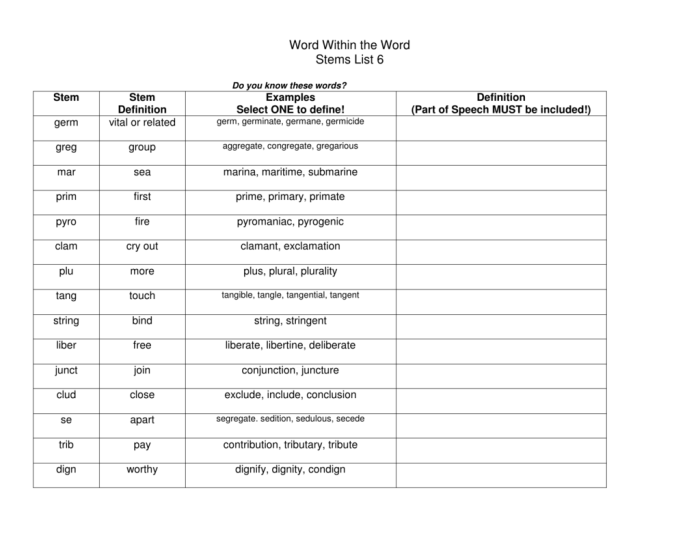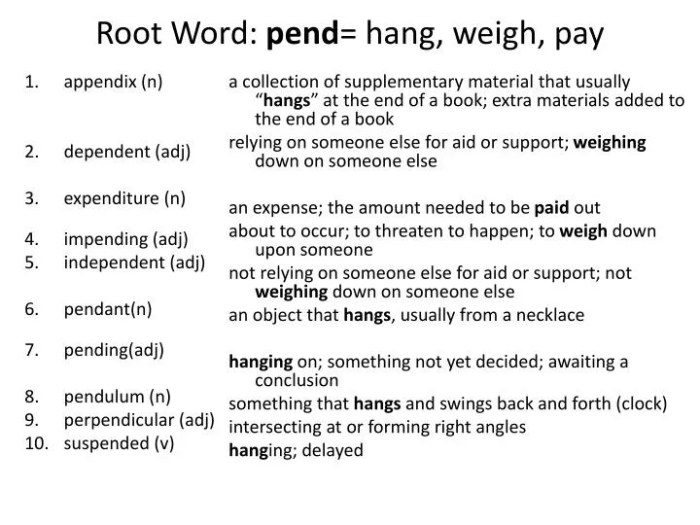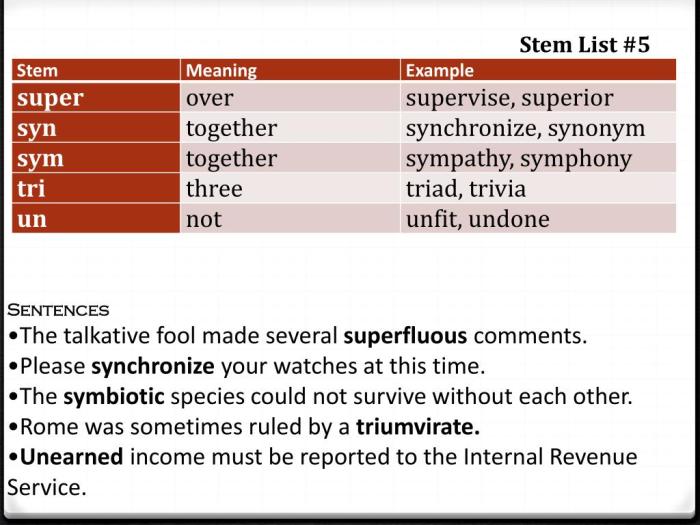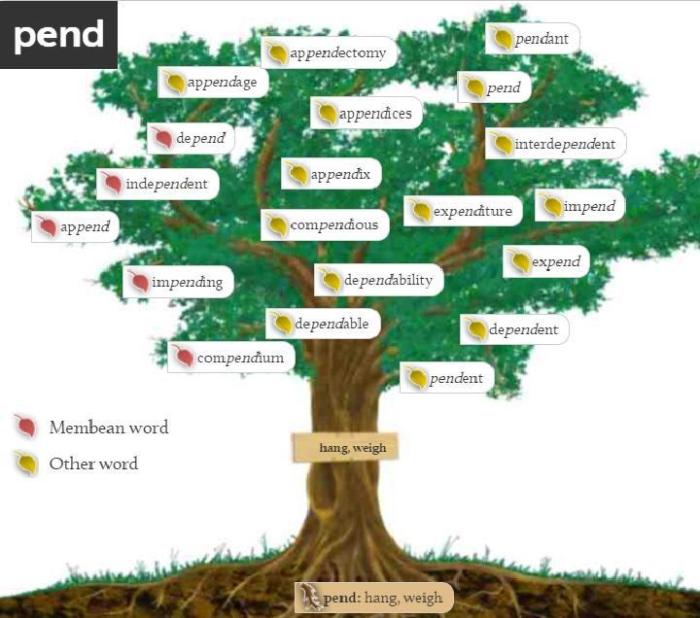Words with the stem pend – Words with the stem ‘pend’ swing gracefully through the tapestry of language, carrying meanings that span time and cultures. From the weighty ‘pendulum’ to the ephemeral ‘pendant’, these words invite us on a journey of linguistic discovery.
Their etymological roots trace back to the Latin ‘pendere’, meaning ‘to hang’, imbuing them with a sense of suspension and movement.
Etymology and Origins of Stem ‘pend’
The stem ‘pend’ has a rich etymological history, tracing its roots across multiple languages and linguistic families. Its origins can be traced back to the Proto-Indo-European root -pend-, meaning “to hang” or “to weigh”. This root gave rise to a variety of words in different languages, each carrying shades of the original meaning.
Indo-European Languages
In Indo-European languages, the stem ‘pend’ is found in words related to suspension, weight, and measurement. For instance, in Latin, we have ‘pendere’ (to hang), ‘pondus’ (weight), and ‘pendulus’ (hanging). In Greek, the stem appears in ‘pendos’ (suspended), ‘pendax’ (hanging), and ‘pendix’ (appendix).
These words demonstrate the stem’s association with the concepts of hanging, weighing, and attaching.
Germanic Languages
In Germanic languages, the stem ‘pend’ evolved into words related to weighing and measuring. In English, we have ‘pendulum’ (a swinging weight), ‘append’ (to attach), and ‘pendulous’ (hanging). In German, ‘pendler’ (commuter) originally referred to someone who weighed goods. These words showcase the stem’s semantic shift towards measurement and quantification.
Romance Languages
In Romance languages, the stem ‘pend’ took on meanings related to spending and expenditure. In French, we have ‘pendre’ (to spend), ‘pendule’ (clock), and ‘pendant’ (earring). In Spanish, ‘pender’ (to hang) also carries the connotation of spending. These words reflect the stem’s association with time and the allocation of resources.
Conclusion
The stem ‘pend’ has undergone a fascinating etymological journey, evolving from its Proto-Indo-European origins to its diverse meanings in modern languages. Its semantic shifts and variations reflect the multifaceted nature of language and the ways in which words adapt to different cultural and linguistic contexts.
Morphological Analysis of Words with Stem ‘pend’

The stem ‘pend’ in English is associated with the concepts of hanging, suspending, or being in a state of uncertainty. Words derived from this stem exhibit diverse morphological structures, including prefixes, suffixes, and root words.
Identification of Words with Stem ‘pend’
- Nouns: appendix, pendant, pendulum, stipend
- Verbs: depend, expend, impend, pend, suspend
- Adjectives: impending, pendent
- Adverbs: pending
Morphological Structure of Words with Stem ‘pend’
The morphological structure of words with stem ‘pend’ varies depending on the part of speech:
- Nouns:
- appendix: root ‘pend’ + suffix ‘-ix’
- pendant: root ‘pend’ + suffix ‘-ant’
- pendulum: root ‘pend’ + suffix ‘-ulum’
- stipend: root ‘pend’ + suffix ‘-ium’
- Verbs:
- depend: root ‘pend’ + prefix ‘de-‘
- expend: root ‘pend’ + prefix ‘ex-‘
- impend: root ‘pend’ + prefix ‘im-‘
- pend: root ‘pend’ + zero suffix
- suspend: root ‘pend’ + prefix ‘sus-‘
- Adjectives:
- impending: root ‘pend’ + suffix ‘-ing’
- pendent: root ‘pend’ + suffix ‘-ent’
- Adverbs:
- pending: root ‘pend’ + suffix ‘-ing’
Semantic Analysis of Words with Stem ‘pend’: Words With The Stem Pend

The stem ‘pend’ conveys the core meaning of ‘hanging’ or ‘suspending’. It encompasses the idea of something being held or supported without direct contact with the ground or a surface. This core meaning manifests in various semantic nuances across words containing the stem ‘pend’.
Semantic Relationships and Nuances
Words with the stem ‘pend’ exhibit semantic relationships that reflect the core meaning of ‘hanging’. For instance, ‘pend’ in the sense of ‘to hang’ denotes the physical suspension of an object. ‘Pending’ refers to a state of temporary suspension or indecision, while ‘pendulous’ describes something that hangs or droops.
‘Append’ implies the addition of something that hangs from or is attached to something else.
- Pend: To hang or suspend.
- Pending: In a state of temporary suspension or indecision.
- Pendulous: Hanging or drooping.
- Append: To add something that hangs from or is attached to something else.
Furthermore, words with the stem ‘pend’ exhibit subtle variations in meaning depending on the context. ‘Suspend’ can refer to both physical suspension and the temporary cessation of something. ‘Dependent’ implies a relationship of reliance or subordination, while ‘independence’ denotes the opposite.
- Suspend: To hang or temporarily cease.
- Dependent: Reliant or subordinate.
- Independence: Not reliant or subordinate.
Syntactic Patterns of Words with Stem ‘pend’

Words with the stem ‘pend’ exhibit diverse syntactic patterns, reflecting their various grammatical functions and roles within sentences. These words commonly appear in the following syntactic constructions:
As Verbs, Words with the stem pend
- Transitive verbs:Words like ‘pend’ and ‘expend’ require a direct object, such as “The government pended the proposal” or “We expended all our resources.”
- Intransitive verbs:‘Depend’ and ‘suspend’ can be used without a direct object, as in “Their success depends on hard work” or “The meeting was suspended due to a power outage.”
As Nouns
- Abstract nouns:‘Expenditure’ and ‘dependence’ represent abstract concepts, as in “The expenditure was excessive” or “Their dependence on foreign aid is a concern.”
- Concrete nouns:‘Pendant’ and ‘appendix’ refer to tangible objects, such as “She wore a beautiful pendant” or “The appendix was removed during surgery.”
As Adjectives
- ‘Pending’ functions as an adjective to describe something that is currently unresolved or in progress, such as “The pending case will be heard next week.”
Collocational Patterns
Words with the stem ‘pend’ often co-occur with specific nouns, verbs, or adjectives, forming fixed or semi-fixed phrases. Some common collocations include:
- “Pending decision” or “pending approval”
- “Expend resources” or “expend energy”
- “Dependent on” or “dependent upon”
Historical Usage of Words with Stem ‘pend’

Words with the stem ‘pend’ have a rich and varied history of usage, dating back to the Latin word ‘pendere’, meaning “to hang”. Over time, these words have evolved in meaning and usage, reflecting the changing cultural and societal contexts in which they have been used.
In the early days of the English language, words with the stem ‘pend’ were primarily used in a literal sense, referring to the act of hanging or suspending something. For example, the word ‘pendulum’ was originally used to describe a weight suspended from a string, and the word ‘pendant’ was used to describe a jewel or ornament that was hung from a chain.
Evolution of Meaning and Usage
Over time, words with the stem ‘pend’ began to take on more figurative meanings. For example, the word ‘pend’ itself came to be used to mean “to be in a state of suspense or uncertainty”, and the word ‘pending’ came to be used to describe something that is waiting to be decided or completed.
For example, words with the stem pend like pending and pendent can refer to something that is hanging or suspended. In a similar vein, the Spanish phrase “pilar hola irene cómo 1” asks how Irene is doing . Incidentally, words with the stem pend are often used to describe something that is incomplete or in progress, like a pending task.
This evolution of meaning is likely due to the fact that the act of hanging or suspending something can often be associated with a sense of waiting or uncertainty. For example, when we say that someone is “hanging on the edge of their seat”, we mean that they are waiting anxiously for something to happen.
Cultural and Societal Influences
The usage of words with the stem ‘pend’ has also been influenced by cultural and societal factors. For example, the word ‘pendulum’ has been used in a variety of scientific and philosophical contexts, reflecting the importance of the concept of balance and harmony in these fields.
Similarly, the word ‘pendant’ has been used in a variety of artistic and literary contexts, reflecting the importance of beauty and adornment in these fields.
Cross-Cultural Analysis of Words with Stem ‘pend’
Words with the stem ‘pend’ have a rich and diverse history across different cultures and languages. While they share a common etymological root, their meanings, connotations, and syntactic patterns vary significantly, reflecting the unique cultural contexts in which they have evolved.
Similarities in Usage
- Many cultures use words with the stem ‘pend’ to denote the idea of hanging or suspending.
- In some languages, these words are also used to describe a state of uncertainty or indecision.
- The syntactic patterns of these words often involve prepositional phrases or verb complements indicating the object or condition of suspension.
Differences in Meaning and Connotation
- In English, the word ‘pending’ has a primarily legal connotation, referring to a matter that is awaiting resolution.
- In contrast, in Spanish, the word ‘pendiente’ can have a more general meaning, referring to anything that is hanging or unresolved.
- The word ‘suspend’ in English carries a sense of temporary interruption, while its equivalent in French, ‘suspendre’, can also imply a more permanent state of cessation.
Cultural Factors Shaping Usage
The cultural factors that shape the usage of words with the stem ‘pend’ include:
- Legal systems:The legal frameworks of different societies influence the specific meanings and connotations of words like ‘pending’ and ‘suspend’.
- Social norms:Cultural expectations and values can shape the way people perceive and use words related to uncertainty and indecision.
- Language contact:Cross-cultural interactions and language borrowing can lead to the adoption and adaptation of words with the stem ‘pend’ in new contexts.
FAQ Insights
What is the origin of the stem ‘pend’?
The stem ‘pend’ traces its roots to the Latin word ‘pendere’, meaning ‘to hang’.
How many parts of speech can words with the stem ‘pend’ belong to?
Words with the stem ‘pend’ can belong to various parts of speech, including nouns, verbs, adjectives, and adverbs.